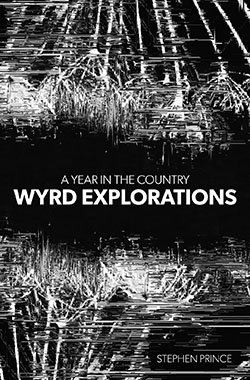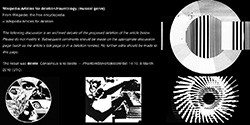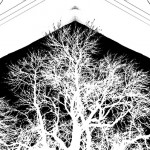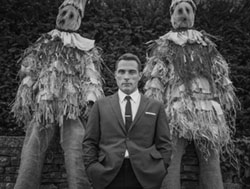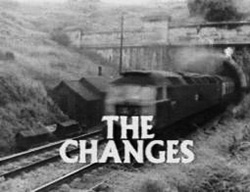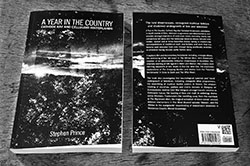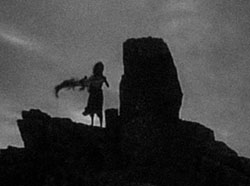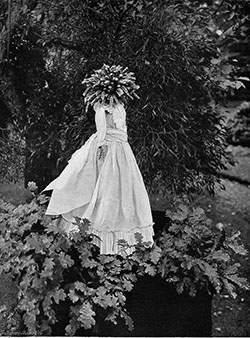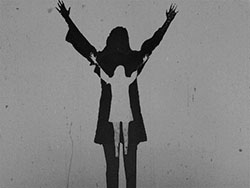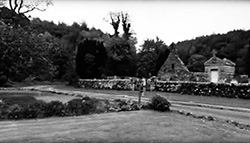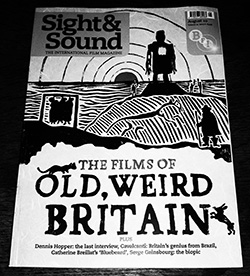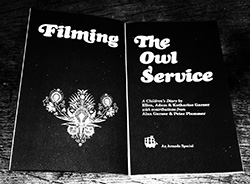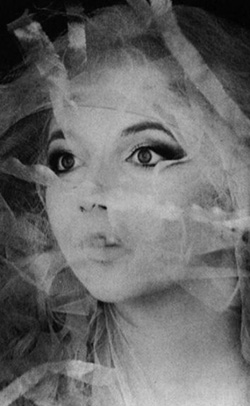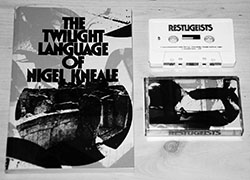Within academic work there has grown an increasing space for, research and interest in a vast variety of often quite fringe or leftfield cultural work.
Once upon a time, not actually all that long ago (although in the decades), you could count the number of say media studies courses available at UK universities on less than the digits of one hand.
Now, well, if you should wander through a university’s library, peruse their prospectuses and/or areas of expertise and research interests of their staff you are almost as likely to come across mentions of say niche cinema as for example more traditional philosophical thought.
Along which lines…
There has been a small but growing gathering of interest in things otherly folkloric, the spectral landscape and related/intertwined hauntological work in academia, part of which has lead to a number of related events and conferences, including:
A Fiend In The Furrows was a 2014 conference on “Perspectives on Folk Horror in Literature, Film and Music”, which was held at Queen’s University in Belfast.
Hauntology: 20 Years On, a one-day academic symposium at the National Media Museum organised by the Communication Culture and Media Research Group which is part of the University of Bradford and which focused on the legacy of philosopher Jacques Derrida, who coined the phrase/concept hauntology.
 While in 2003 there was a three day academic conference on The Wicker Man called The Wicker Man: Readings Rituals and Reactions at the University of Glasgow, which lead to the production of a book which collected essays based on the papers presented at the conference called Constructing The Wicker Man published in 2005, which in turn lead to a further academic collection of essays, The Quest for the Wicker Man: Historical, Folklore and Pagan Perspectives, which featured an intertwined set of writers and editors.
While in 2003 there was a three day academic conference on The Wicker Man called The Wicker Man: Readings Rituals and Reactions at the University of Glasgow, which lead to the production of a book which collected essays based on the papers presented at the conference called Constructing The Wicker Man published in 2005, which in turn lead to a further academic collection of essays, The Quest for the Wicker Man: Historical, Folklore and Pagan Perspectives, which featured an intertwined set of writers and editors.
More recently in Glasgow in 2017 as part of the Merchant City Festival there was an event called Deconstructing The Wicker Man, which involved a screening of the film and also featured discussions by Dr Jonny Murray who was involved in the above University of Glasgow event/Wicker Man book and Dr Lizanne Henderson of the University of Glasgow.
Travelling along interconnected cultural pathways, The Alchemical Landscape at the University of Cambridge is a research group which has hosted a number of ongoing events and discussions and focuses in part on “occultural” representations of rural, landscape and spectral work.
Alongside discussions of The Wicker Man at such events there have been considerations of the pastoral noir aspects of Shirley Collins’ music, folk music traditions in relation to hauntology, numerous folk horror/hauntology related presentations and screenings including the likes of Witchfinder General, The Ash Tree, The Stone Tape and other work by Nigel Kneale and so forth.
The events have also included performances, talks etc by the likes of author Chris Lambert, who has contributed to the Tales From The Black Meadow project which creates a multi-faceted fictitious otherly folkloric/hauntological world, Mark Fisher who was the author of hauntology related book Ghosts of My Life and Robin The Fog of Radiophonic-esque tape loop manipulators Howlround.
They have also included a talk by Drew Mulholland whose album The Séance at Hobs Lane, released under the name Mount Vernon Arts Lab, was inspired in part by Nigel Kneale’s Quatermass work alongside “Victorian skullduggery, outlaws, secret societies and subterranean experiences” and which was re-released by Ghost Box Records.
(As an aside Drew Mulholland has worked both as an independently released musician and as Glasgow University’s geography and astrophysics department’s composer-in-residence. His work in the later 1990s and turn of the century such as the albums The Séance at Hobs Lane and One Minute Blasts Rising To Three And Then Diminishing, which was recorded 100 feet below ground in an abandoned nuclear bunker, can be seen as forebears to hauntological work.)
Related events have also included Andy Sharp of English Heretic / Eighth Climate, who work within the flipside, undercurrents, occult and hidden reverse of culture, history and the landscape:
“It is our task at English Heretic, ostensibly, to maintain, nurture and care for the psychohistorical environment of England.”
And also Sharron Kraus, whose work seems imbued with a sense of very personal research that takes in layered tales of the land, folk music and folklore.
To a degree and in part, what such events and academic research seem to focus on and reflect is the earlier mentioned interwining of otherly or flipside of folk and rural culture and the more spectral concerns of hauntology, something which is reflected in The Alchemical Landscape’s About page which includes the following text, saying it has two intersecting points of focus, which are:
“The artistic representation of the British landscape as an uncanny if not haunted space, and the use of comparable ‘spectral’ language to speak about matters of environment, property and value. From economic ghost towns to geomantic visitations, the interest of the Alchemical Landscape project lies with the way these tropes describe the ‘natural’ landscape of contemporary Britain and its geographic, architectural and symbolic histories.”
File under: Trails and Influences / Year 3 Wanderings
Intertwined wanderings around these parts:
Day #23/365: Nigel Kneale’s The Stone Tape – a study of future haunted media
Day #58/365: Lullabies for the land and a pastoral magicbox by Ms Sharron Kraus
Day #142/365: Fog Signals/Ghost signals from lost transmission centres
Day #167/365: Wandering back through the darkening fields and flickerings to imaginary soundtracks…











